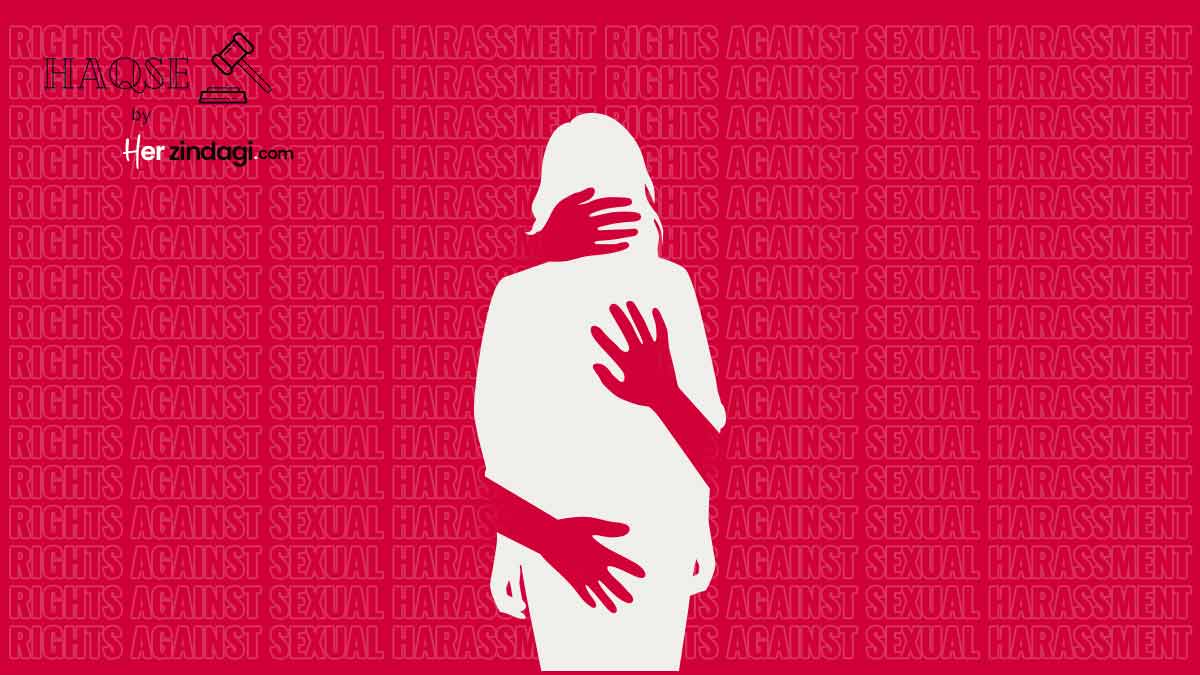
HaqSe: Women Rights Against Sexual Harassment, Explained
We inhabit a world where women can’t afford safety. Women's safety across the country continues to be poor and there seems to be no silver lining. A report by World Bank for year 2022 states that in Delhi, 88 percent women faced sexual harassment in public transport. However, only one percent reported it to the police as per the survey. Surprising? Not at all! The sexual harassment numbers are on a rise and looks like rampant cases have desensitised most of us.
One reason why women fail to voice against sexual abuse is the unawareness around their rights. With our new series, HaqSe, we have been untangling all your rights with a legal expert with an Instagram live. Ahead of our weekly episode this Friday, we thought of breaking down your rights against sexual harassment in the country. We spoke to Ms. Shivee Pandey Sinha, Advocate, Supreme Court of India and she shared an explainer on woman’s rights against sexual harassment in India.
Do Women Have Rights Against Sexual Harassment?
Advocate Shivee Pandey Sinha said, “Sexual harassment is a form of gender-based violence that has become an unfortunate reality for many women in our society. Women have the right to be free from sexual harassment in any setting, including the workplace, educational institutions, and public places.”
Right To A Safe Workplace
Women have the right to work in an environment that is free from sexual harassment. Employers are responsible for creating a safe and healthy workplace, which includes preventing and addressing sexual harassment.
1
2
3
4
Right To File A Complaint
If a woman is sexually harassed, she has the right to file a complaint with their employer or a government agency. Employers are required to have a complaint procedure in place, which includes investigating complaints and taking appropriate action to prevent further harassment.
Right To Confidentiality

Women have the right to confidentiality when reporting sexual harassment. Employers are required to keep all complaints confidential and to protect the privacy of the individuals involved.
Right To Protection From Retaliation
If a woman reports sexual harassment, she has the the right to protection from retaliation. In this case, the employers are prohibited from retaliating against employees who file a complaint or participate in an investigation.
Right To Legal Action
Women who have been sexually harassed have the right to pursue legal action against their harasser and their employer. Legal action can include filing a lawsuit for damages or filing a complaint with a government agency.
Right To A Harassment-Free Education
Women also have the right to a harassment-free education. Educational institutions are required to have policies and procedures in place to prevent and address sexual harassment.
Right To Support
Women who have been sexually harassed have the right to support from their employer, coworkers, family and friends. Support can include counseling, advocacy, and referrals to other resources.
What Should A Woman Do If Sexually Harassed?

It is important for a woman who has been subjected to sexual abuse to take action to protect herself. For the same, she should speak up. The first step that a woman should take is to speak up and call out the unwanted behavior. She can do this by directly telling the harasser to stop, or by making it clear through her body language and tone of voice. Next, the expert said, “ Document the harassment, add details like the date, time, location, and nature of the incident. This can be helpful if you decide to report the harassment to your employer or to law enforcement.”
If the harassment does not stop after speaking up, or if the harasser is threatening her, she should report the harassment to her employer or to law enforcement. Employers are legally obligated to take action to stop harassment in the workplace, and law enforcement can help to protect a woman's safety and rights.
Lastly, women should not hesitate from seeking support from friends, family members, or a mental health professional. Sexual harassment can be a traumatic experience, and having support helps.
Don't Miss: PoSH Act: 9 Things Women Must Know About Reporting Sexual Harassment At Workplace
What Is The Punishment For Sexual Harassment Under Law?
Further, we asked our legal expert to share the punishment for sexual harassment. She said, “In India, the punishment for sexual harassment depends on the severity of the offense. The law that governs sexual harassment in India is the Sexual Harassment of Women at Workplace (Prevention, Prohibition and Redressal) Act, 2013. Under this law, sexual harassment is a criminal offence and is punishable with imprisonment for a term ranging from three months to three years and/or a fine. The severity of the punishment depends on the gravity of the offense, and whether it is a first-time or repeat offense. In addition to the criminal penalty, the perpetrator may also be liable to pay compensation to the victim.”
Don't Miss: Faces Of Courage: Piyush Mishra, Kushboo Sundar Share Their Stories Of Sexual Abuse
She added, “In addition to the workplace, sexual harassment is also a criminal offense under the Indian Penal Code (IPC). Section 354 of the IPC deals with assault or criminal force on a woman with the intent to outrage her modesty, and provides for imprisonment for a term ranging from one to five years and/or a fine. Section 509 of the IPC deals with using words or gestures intended to insult the modesty of a woman and provides for imprisonment for a term of up to three years and/or a fine.”
Herzindagi video
1
2
3
4